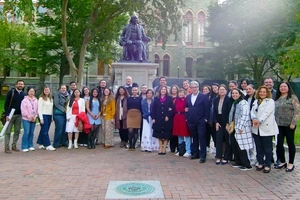Biography
Manuel González Canché brings an innovative set of tools — including econometric, geospatial, and network analysis methods — to study the structural factors that influence minority and at-risk students' likelihood of success, including less access to financial, academic, and social resources. He aims to identify plans of action capable of closing these social and economic gaps. His work has already challenged traditional ideas about access, persistence, and success in higher education, and has led to a better understanding of the effect of location, influence, and competition.
González Canché joined the Higher Education division as an associate professor in 2017. At Penn GSE he also serves as affiliated faculty with the Human Development and Quantitative Methods division and the International Educational Development Program. In addition, he is a senior scholar in the Alliance for Higher Education and Democracy.
As a low-income and first-generation college student, González Canché has a special interest in understanding structural factors that influence minority and at-risk students’ likelihood of educational and occupational success. He aims to identify plans of action capable of closing social and economic gaps resulting from students’ reduced access to financial, academic, and social resources. His findings have offered a more nuanced understanding of the effect of location, influence, and competition, and have challenged traditional ideas about access, persistence, and success in higher education.
González Canché is the 2016 recipient of the Association for the Study of Higher Education’s Promising Scholar/Early Career Award. He has secured funding for research from the Spencer Foundation, the American Education Research Association/National Science Foundation, the Association for Institutional Research, and the Institute of Education Sciences. González Canché is currently a Fellow in the Institute in Critical Quantitative, Computational, & Mixed Methodologies Fellows Program where he serves as a mentor.
Education
- Ph.D. (Higher Education, cognates in Biostatistics, Economics, and Sociology) University of Arizona, 2012
- M.S. (Educational Research, concentration on quantitative modeling) Autonomous University of Aguascalientes, 2007
- B.A. (Educational Research, concentration on Physics, Mathematics, and Computer Systems and software development) Autonomous University of the Yucatan, 2005
Areas of Expertise
- Pathways for underrepresented minorities
- Community colleges
- Experimental and quasi-experimental design
- Statistical and geographical network analysis
- Data visualization
- Big and geocoded data
Awards & Honors
Academic Programs
Research Interests and Current Projects
González Canché’s research follows two interconnected paths. The first concerns issues of access, persistence, and success, with an emphasis on institution effects--such as 2-year versus 4-year college and distance from home—on students’ outcomes The second focuses on higher education finance, with emphases on spatial modeling and competition based on spatial proximity and spillover effects.
In his research González Canché employs econometric, quasi-experimental, spatial statistics, and visualization methods for big and geocoded data, including geographical information systems, representation of real-world networks, and text-mining techniques. In related work, he aims to harness the mathematical power of network analysis to find structure in written content. He is proposing an analytic method (Network Analysis of Qualitative Data) that blends quantitative, mathematical, and qualitative principles to analyze text data. Similarly, he is also proposing the implementation of geographical network analyses that merge network principles and spatial econometrics to model spatial dependence of the outcome variables before making inferential claims. Both of these approaches are yet to be broadly implemented in higher education research.
Recent projects include:
- Overcoming the Geography of Disadvantage: A Spillovers Framework to Identify Structural Means to Enhance Community College Students' Educational Outcomes Despite Their Location. Funding: $70,000. NAED/Spencer postdoctoral fellowship. Funding period: January 2019–December 2020.
- Employment Volatility in the Academic Workforce: Implications for Faculty Financial and Retirement Plans. Funding: $70,000. TIAA institute. Funding period: April 2019– February 2020.
- The Effect of the Uniform Bar Examination on Diversity, Affordability, and Employment Prospects. Funding: $71,128. AccessLEX Institute. Funding period: April 2019–September 2020.
- Estimating the Effect of Losing the Federal Loan Subsidy on Debt Accumulation for Law and Professional Students in the United States: Evidence From a Natural Experiment (Principal Investigator). Funding: $49,997. Association for Institutional Research, Access Group/AIR Grant (grant #RG1606). Funding period: March 2016–April 2017.
- Are there Any Educational and Financial Detriments Associated with Nearby College Enrollment? (Principal Investigator). Funding: $20,000. American Education Research Association/National Science Foundation (grant #DRL-0941014). Funding period: March 2016–August 2017.
- Toward an Alliance to Prepare a National Faculty for Broadening Success of Underrepresented 2-Year and 4-Year STEM Students (Senior Personnel). Funding: $300,000. National Science Foundation. Funding period: January 2017-January 2019.
- The Gendered Career Path from Doctorate to Faculty Appointment: A Multi-State Analysis (Co-Principal Investigator). Funding: $39,966, AIR/NCES/NSF (grant #RG15-9240). Year: 2015–2016.
- Improving the Teaching and Learning of English Language Learners: The Instructional Conversation Model (Co-Principal Investigator). Funding: $1.5 million. Institute of Education Sciences, U.S. Department of Education. Funding period: 2012–2016.
- Financial Benefits of Student Loan Repayment: An Analytic Framework Employing Two Decades of Data (Principal Investigator). Funding: $35,100. The Spencer Foundation (grant #201500116). Funding period: January–December 2015.

